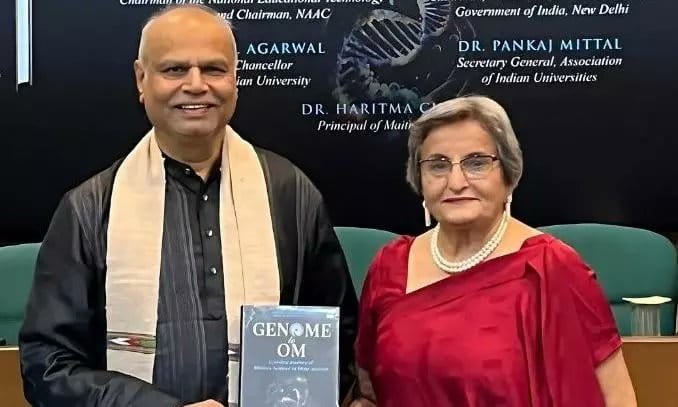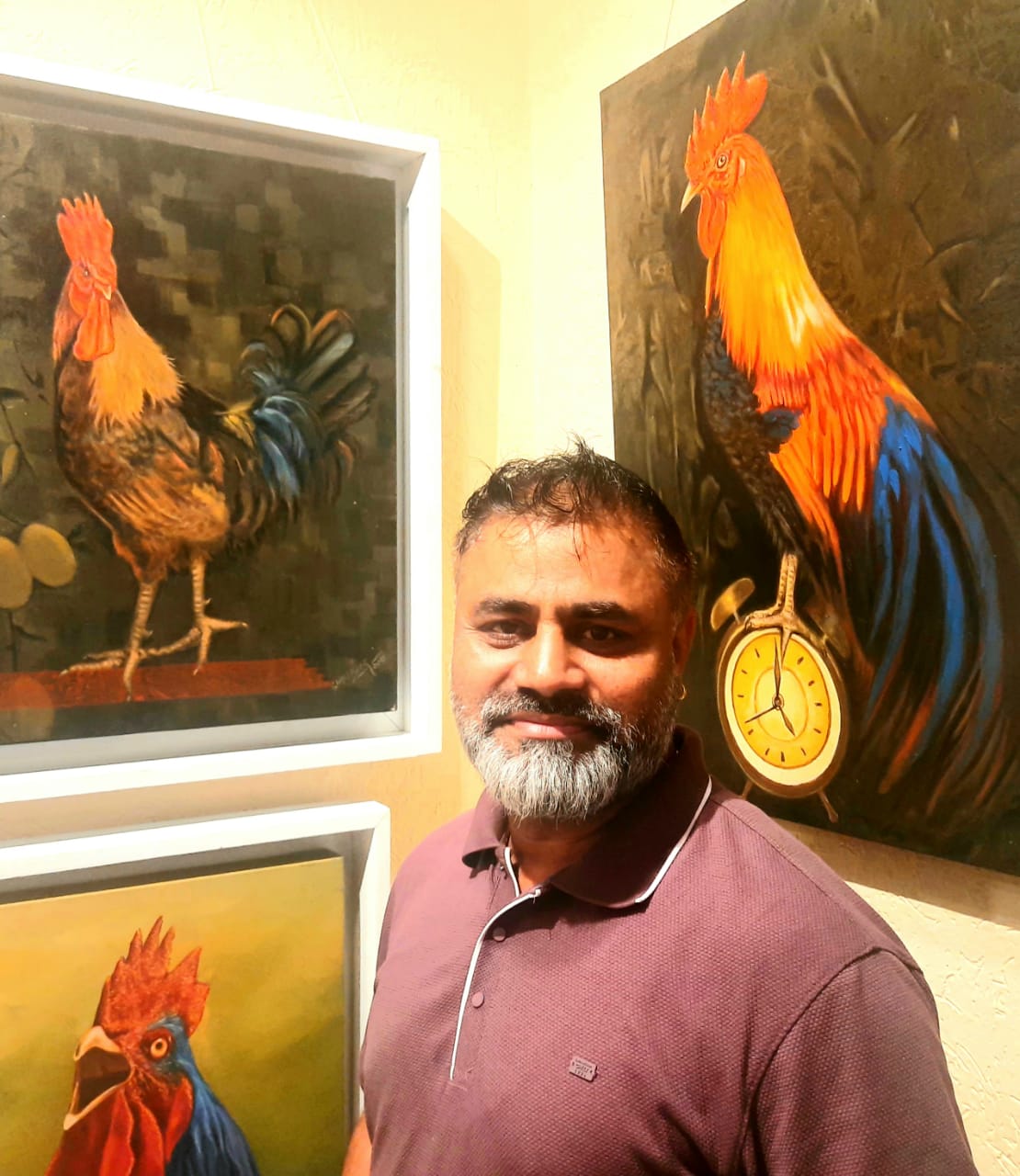Genome to Om, authored by Dr. Bhushan Patwardhan and Indu Ramchandani, is an intellectual odyssey, charting an ambitious course from the realms of modern science to the profound domain of meta-science. This oeuvre, published by BluOne Ink, elegantly intertwines ethical, moral, and spiritual dimensions, elucidating the indivisible unity of life in all its myriad manifestations.
The authors champion a panoramic, integrative approach to science, celebrating its extraordinary achievements while issuing a clarion call against the existential threats that unchecked technological prowess may pose to sentient beings and the biosphere on the larger dominion. Provocative inquiries into the cosmic enigma, the origins of life, and, quintessentially, the telos of human existence are masterfully dissected within these pages.
In this visionary treatise, “Genome” epitomizes the relentless dynamism of contemporary science, while “Om” serves as the metaphysical beacon of universal consciousness—the ultimate ontological reality. Genome to Om aspires to bridge the chasm between empirical rigor and transcendent wisdom, proposing a future that is not only technologically advanced and inclusively transformative but also spiritually resonant and ethically vigilant.
The authors of Genome to Om proffer a daring paradigm shift, advocating for the transition from the Anthropocene—an epoch marked by human dominion over nature—to an idealized “Omcene,” an era of holistic harmony. The book Genome to Om imparts a hopeful vision of a meta-society, where scientific progress coalesces seamlessly with perennial human values, fostering unity in diversity as the bedrock for universal concord and collective human flourishing—an odyssey encapsulated in the “Om Way.”
In a captivating dialogue with The Interview World, Dr. Bhushan Patwardhan and Indu Ramchandani—luminaries of the intellectual firmament behind Genome to Om—expound upon the juxtaposition of “Genome” and “Om” and their abiding significance within the contemporary zeitgeist. They elucidate the profound interplay between scientific innovation and the ethical, moral, and spiritual imperatives that should ideally govern human endeavor.
Traversing both the microcosmic and macrocosmic realms, they underscore “unity in diversity” as an indispensable ideal for global amity. This dialogue traverses the contours of empirical knowledge and higher-order sagacity, envisioning a societal metamorphosis from the Anthropocene towards the aspirational Omcene, offering readers a wealth of wisdom and an invitation to partake in a shared future of illumination and purpose. Herein lies a glimpse into their riveting exchange on Genome to Om.
Q: Your book contrasts “Genome,” representing modern science, with “Om,” symbolizing universal consciousness. Can you elaborate on how you see the relationship between these two concepts and their relevance to contemporary society?
A: “Genome” is emblematic not only of the frontiers of modern science but also of the intricacies of the microcosm. Scientific thought, as it has advanced, is steeped in reductionism—an approach dedicated to dissecting “nature at its most infinitesimal scales.” Researchers, with relentless zeal, plumb the depths of atomic particles and molecules. Yet, might this microscopic fixation foster a blinkered perspective, tethered to individual pursuits at the cost of a grander vision? Equally imperative is the contemplation of the macrocosm, where truth is apprehended through profound and direct experience.
“Genome” and “Om” thereby coalesce, symbolizing the synthesis of the microcosm and macrocosm, an emblem of science intertwined with spirituality, and an ode to the indivisible bond between the self and universal consciousness. This union resonates with the Upanishadic tenets of poorna, pinda, and brahmanda; para and apara vidya; vijnana and prajñana—principles evocative of quantum entanglement, that perennial dance of non-duality, and unity amid diversity.
This ancient sagacity found modern affirmation with the Nobel Prize in Physics in 2022, awarded for research in quantum entanglement, underscoring a truth known to the seers of yore: that in the deepest, most profound sense, existence is an indivisible oneness, a boundless tapestry woven from the threads of interconnected being.
Q: You emphasize a holistic scientific approach that integrates ethical, moral, and spiritual insights. How do you envision this integration impacting the way we approach scientific research and technological development?
A: The perennial human pursuit of happiness often manifests as a craving for material comfort, security, and ease. In the last seven or eight centuries, prodigious scientific discoveries and technological advancements have catapulted us from the age of bullock carts to the supersonic era. But one must ask: at what cost?
This relentless march of scientific progress now appears ensnared by the tendrils of ego, avarice, and insatiable desires, precipitating our descent from the Holocene into the Anthropocene epoch. The first chapter unveils the marvels of science; yet, with a rueful acknowledgment, the second chapter confronts us with the attendant perils, forcing a reckoning with the existential consequences of our headlong charge into modernity.
Q: The book raises questions about the wonders of the cosmos and the origin of life. What inspired you to explore these profound topics, and how do they relate to your overall message in the book?
A: Contemplating the marvels and menaces of science impels us to arrest our heedless sprint down the path of “progress and modernity,” for in this mad dash, we have lost sight of our very essence and origins. Cosmology, in its august quest, continues to probe the primordial questions of existence; yet, in the humdrum of our quotidian lives, we have severed our connection to this cosmic inquiry altogether.
Thus, it becomes imperative to comprehend the genesis of our world, to unravel the mysteries of its inception. The boundless grandeur of the cosmos serves as a stark reminder of our infinitesimal presence on this “pale blue dot,” humbling us into acknowledging a reality far greater than our transient concerns. How, then, can we afford to remain ignorant of the universal, cosmic energy that holds all existence in its transcendent embrace?
Q: You discuss the idea of seeking “unity in diversity.” Can you explain how this concept applies to both human societies and the natural world, and why it is essential for achieving universal peace and well-being?
A: “Unity in diversity” stands as an imperative credo, one whose relevance is both pressing and profound. In an era convulsed by wars, violence, and unbridled animosity—where anger and hatred fuel an impending self-obliteration—diversity has tragically morphed into a symbol of separation and alienation. The insidious drive to assert superiority over the “other” has paved the way to environmental, societal, and political ruination.
The specter of a sixth mass extinction is not mere dystopian fiction; it is a harrowing reality. Thus, the principle of “unity” must be profoundly grasped and conscientiously integrated into our lives, for only through such unity can peace and well-being attain any semblance of enduring substance.
Q: How do you differentiate between empirical knowledge and higher-order wisdom, and what role do you believe each should play in shaping our future?
A: Scientific research necessitates empirical proof, which serves as the cornerstone for validating scholarly inquiries and their attendant outcomes. In stark contrast, higher-order wisdom—our profound understanding of human nature—emanates from direct experience.
Vedic philosophy elegantly posits anubhava and anubhuti as intertwined avenues in the relentless pursuit of knowledge and truth. Anubhava, or “experiential knowledge,” resonates with the tenets of modern science, emphasizing meticulous observation, rigorous experimentation, and incisive analysis. Conversely, anubhuti, denoting “sensory and emotional response,” delves into the realms of intuition and the realizations that emerge from such knowledge, embodying what may be aptly described as meta-science.
The illustrious German mathematician Carl Friedrich Gauss, who later graced the faculty at the University of Göttingen, maintained that while he possessed an innate understanding of the results he derived, he grappled with articulating the methodologies that guided him to these conclusions.
In a similar vein, India’s own Srinivasa Ramanujan revolutionized the domain of mathematics through his extraordinary intuitive insights. His groundbreaking formulas, initially bereft of formal proofs, galvanized mathematicians to forge a bridge between intuition and rigor, thereby advancing the very frontiers of modern knowledge.
The disciplines of yoga, mindfulness, and meditation yield transformative insights that defy conventional understanding. Thus, if we reject the notion that these two pursuits—science and spirituality—exist as divergent paths eternally destined to remain unmerged, we may instead cultivate a more holistic future. Ultimately, the quest for truth lies at the nexus of both domains, illuminating a shared aspiration that transcends the limitations of either.
Q: You propose the possibility of progressing from the Anthropocene to an ideal Omcene epoch. What characteristics would define this Omcene society, and what steps do you think we need to take to move towards it?
A: The unrelenting pursuit of material gain has heralded the Anthropocene, an epoch wherein human-made biomass has surpassed the planet’s total natural biomass, significantly contributing to the alarming decline of biodiversity. This era is marked by humanity’s profound and deleterious impact on the Earth. Ongoing conflicts have further shrouded the pursuit of global well-being, impeding our collective progress.
In this context, we must chart a course toward a more harmonious existence—an envisioned world of meta-societies grounded in compassion, simplicity, and universal welfare. We term this transformative vision the Omcene epoch.
The transition from the Anthropocene to the Omcene is no straightforward endeavor; it necessitates a concerted global effort. We must advocate for an educational paradigm that prioritizes empathy and environmental stewardship. We aspire to cultivate meta-societies where sustainable practices, encompassing renewable energy and mindful consumption, are not merely aspirational but integral to our way of life.
Each individual must manifest a commitment to international cooperation in addressing formidable global challenges such as climate change. The insights of diverse indigenous communities—who possess an intrinsic understanding of local ecosystems—can be invaluable. Furthermore, international scientific collaboration is imperative to catalyze innovations in renewable energy and carbon capture technologies.
From the vantage of deeper and higher wisdom—especially as extolled in Eastern traditions like Buddhism and articulated in the Bhagavad Gita—the ideal lies in fostering detachment from material desires and attaining enlightenment through compassion for all sentient beings. These profound philosophies resonate harmoniously with the fundamental tenets of the Omcene.
Q: How do you reconcile the sometimes-perceived conflict between scientific inquiry and spiritual beliefs in your writing, and what message do you hope to convey to readers who may hold differing views on this topic?
A: In our writing, we have embraced a distinctly agnostic approach, meticulously articulating perspectives from both atheists and advocates of spiritual beliefs and insights. While we delve profoundly into the Indian knowledge system, we simultaneously illuminate a spectrum of religious and philosophical viewpoints. This rich tapestry of ideas is laid bare for readers, inviting them to engage critically and arrive at their own conclusions.
Q: What do you hope readers will take away from Genome to Om, and what actions do you encourage them to undertake in their personal lives or communities to promote the ideas presented in your book?
A: The takeaway is both clear and compelling. We are all acutely aware of the wonders of science and technology; their profound effects are palpable in our daily lives. It is high time for modern science to pause, reflect, and critically evaluate its current trajectory. The paramount purpose of scientific discoveries and cutting-edge technologies must be the promotion of universal well-being and peace. We must remain vigilant against the potential misuse of these advancements, which often arise from selfish motivations and narrow ambitions.
Furthermore, we must cultivate an awareness of the universal consciousness that binds all of nature and humanity. By turning our gaze inward, we can awaken to the underlying oneness that exists among us, nurturing a perspective that prioritizes universal well-being as an essential goal in life. Genome to Om offers insights that have not only enriched our understanding but may also empower discerning readers to enhance their beliefs and convictions.
Crucially, we do not seek to pass judgment or endorse any biases. We are neither authenticating nor speculating; rather, we articulate our observations as they are, with the intention of provoking introspection and facilitating the evolution of modern science into a more profound meta-science.









